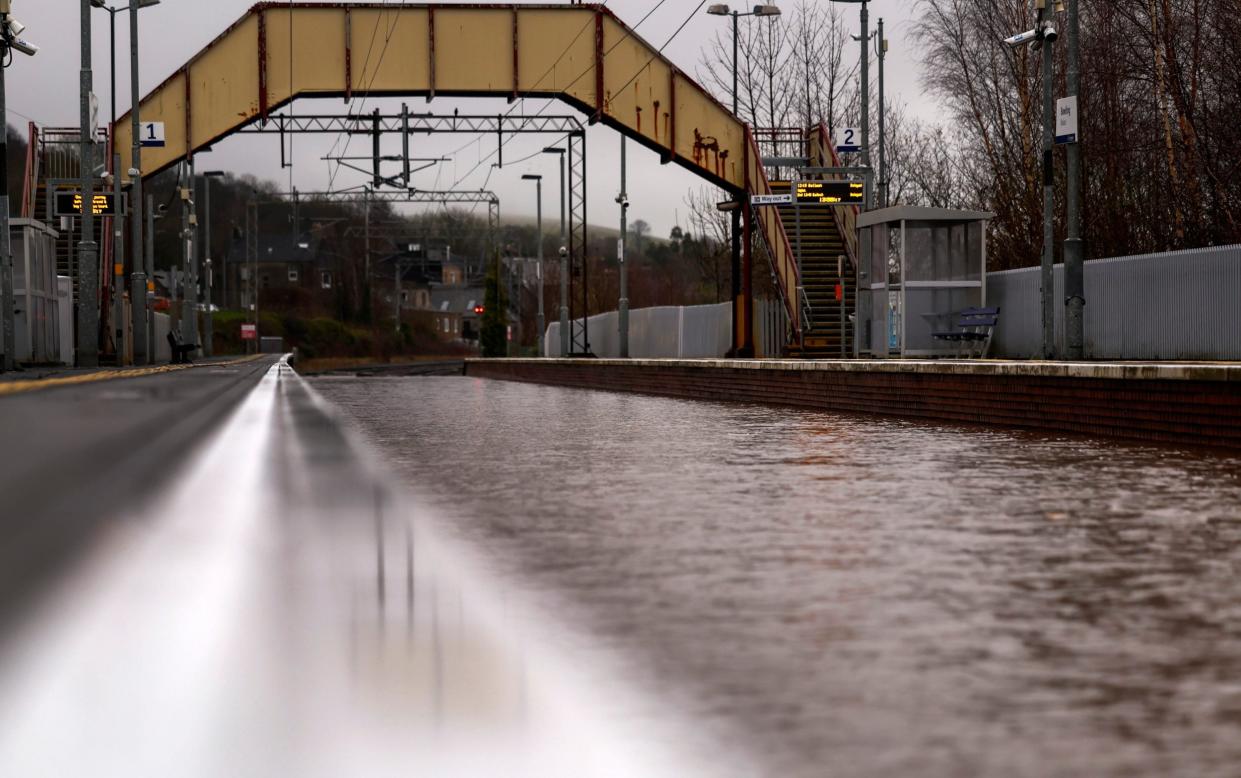Falling weather delays undermine rail chief’s climate warning

Weather-related train disruption has decreased over the past few years despite the Network Rail chief executive claiming climate change is “the biggest challenge our railway faces”, The Telegraph can reveal.
On Wednesday, the state-owned company said it would be spending £2.8 billion to help it cope better with extreme weather and climate change.
Its plans include training rail staff as “amateur meteorologists” and buying weather forecasting services that are accurate to within 500 metres.
Andrew Haines, the Network Rail chief executive, also said extreme weather had “taken its toll” on the network.
Yet data analysis by The Telegraph reveals that, for the last three years, the proportion of delays attributed to “weather, autumn and structure” has been decreasing.
“Weather, autumn and structure” covers delays caused by natural phenomena such as high wind or heavy rain, as well as autumn leaf fall. Leaf debris causes braking problems for trains, similar to the way in which ice causes cars to skid.
The increased climate spending pledge calls into question how wisely Network Rail is using its £45.4 billion budget for the next five years.
In 2020-21, train delays caused by “severe weather, autumn and structures” made up 10.3 per cent of all delay minutes counted by regulators, according to figures from the Office of Rail and Road (ORR) analysed by The Telegraph.
By last year that share had declined to 7.7 per cent – just over a million minutes – out of 2023’s total train delays of 13.7 million minutes.
England saw a record amount of rainfall in the 18 months to March. A total of 1,695mm of rain fell during this time, the largest amount since Met Office records began in 1836, while total train delays added up to 13.5 million minutes. Of those, 1.9 million – 14 per cent – were attributed to weather.
Martin Frobisher, Network Rail’s group safety and engineering director, told BBC Radio 4’s Today programme on Wednesday: “Climate change is happening right now. It’s affecting the railway with flooding in winter and hotter summers than we’ve ever seen before.”
Mr Haines said: “Climate change is the biggest challenge our railway faces. The extreme weather of the past year that has seen an unprecedented 14 named storms has taken its toll on our railway – with experts predicting more of the same to come.”
The Government is backing the rail company’s plans, with Huw Merriman, the rail minister, saying people across the country relied on the railways.
“That’s why the network must be fit for the future, with the resilience to handle extreme weather while offering the reliability and level of service our passengers deserve,” he said.
“I am confident the plan set out by Network Rail today will help keep our railways on track for the coming years.”
But John O’Connell, the chief executive of the TaxPayers’ Alliance, said: “Taxpayers are tired of quixotic quangos trying to save the world rather than addressing problems at home.
“Network Rail is expected to deliver reliable, safe, and high-quality railway infrastructure, yet it’s diverting billions of pounds towards solutions to a problem that is having less and less of an impact on the network.”
Tory MP Craig Mackinlay, of the Conservatives’ Net Zero Scrutiny Group, said: “This money appears to be being spent on activities that would need to happen anyway, regardless of climate change.
“It’s clear we need a rail network that can handle all weathers, but I would be very interested to find out which observational data they are using to attribute this spending to climate change, and what predictions they are using about the future.”
Andrew Montford, the science writer and author of The Hockey Stick Illusion, said: “The kinds of weather that affect rail services are not getting worse. Winters are milder, wind speeds are falling, and extreme rainfall has barely changed. What is getting worse is the tendency of official bodies to make foolish statements about climate change.”
As part of its £2.8 billion climate spending, Network Rail has pledged that “hundreds of key operational staff” will attend a new “weather academy” to turn them into “amateur meteorologists”.
It said this would help them understand weather forecasts in order to make better operational decisions, such as when and where to slow trains down in stormy conditions.
Train delays have worsened recently despite an increased focus on problem areas such as the stretch between Reading and London Paddington, which will receive £140 million of maintenance under a new plan to improve reliability.
Over the year leading up to February 2024, the average delay per train in Britain was up 42.2 per cent on the same period two years earlier, ORR data show.
Network Rail’s £45.4 billion budget for the next five years is made up mainly of government grants and income from track access fees charged to train companies, themselves mostly funded by the taxpayer.
The company’s other climate-related spending targets include ground movement sensors to pick up when landslides are likely to happen and extra CCTV at high risk flooding sites.
Last year, the Government provided £11.9 billion in taxpayer funding to run the railways, including £7.5 billion handed directly to Network Rail.


